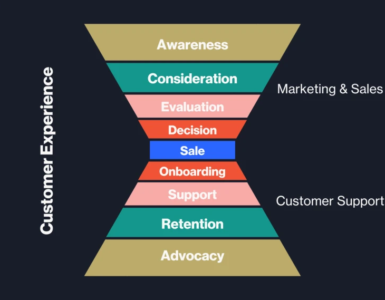In the dynamic digital landscape, a well-structured and high-performing digital marketing team is essential for businesses to thrive. But building such a team isn’t simply about assembling a group of talented individuals. It’s about carefully orchestrating a symphony of skills, expertise, and collaboration to achieve remarkable results.
This comprehensive guide will walk you through the intricacies of building the perfect digital marketing team structure, drawing inspiration from industry best practices and real-world examples. We’ll delve into the essential roles, their responsibilities, reporting structures, and how to tailor your team based on your business size and objectives.
Key Roles in a Digital Marketing Team
A well-rounded digital marketing team comprises individuals who specialise in various disciplines. Let’s explore some of the critical roles and their responsibilities:
- Head of Digital/VP of Marketing
The Head of Digital or VP of Marketing serves as the ship’s captain, overseeing the entire digital marketing strategy and ensuring its alignment with the company’s overarching goals. Their responsibilities include:
- Setting the overall digital marketing vision and strategy.
- Leading and managing the digital marketing team.
- Allocating resources and budget effectively.
- Monitoring and analysing campaign performance.
- Reporting to senior management on progress and ROI.
- Digital Marketing Manager
The Digital Marketing Manager is pivotal in executing the digital marketing strategy and managing day-to-day operations. Their responsibilities encompass:
- Planning and executing marketing campaigns across various digital channels.
- Managing the marketing budget and tracking expenses.
- Coordinating with other teams, such as sales and product development.
- Analysing campaign data and reporting on performance.
- Staying abreast of the latest digital marketing trends and technologies.
- SEO Specialist
The SEO Specialist optimises the website and its content to improve organic search rankings and visibility. Their duties include:
- Conducting keyword research and analysis.
- Optimising website content and structure for search engines.
- Building high-quality backlinks to the website.
- Monitoring website traffic and performance.
- Staying updated on the latest SEO algorithms and best practices.
- Content Manager
The Content Manager leads the content marketing strategy, ensuring all content is aligned with brand guidelines and resonates with the target audience. Their responsibilities include:
- Developing and implementing the content marketing strategy.
- Creating and curating high-quality content across various formats (blogs, videos, social media posts, etc.).
- Managing the content calendar and ensuring timely publication.
- Promoting content across different channels to maximise reach and engagement.
- Analysing content performance and identifying areas for improvement.
- Social Media Manager
The Social Media Manager is responsible for creating and executing a compelling social media strategy to engage the target audience and build brand awareness. Their key tasks involve:
- Developing and managing the social media content calendar.
- Creating and publishing engaging social media content.
- Interacting with followers and managing online communities.
- Running social media advertising campaigns.
- Monitoring social media metrics and analysing performance.
- Paid Media Specialist
The Paid Media Specialist manages and optimises paid advertising campaigns across various platforms. Their responsibilities include:
- Conducting thorough keyword research and audience targeting.
- Created and managed paid advertising campaigns on platforms like Google Ads, social media, and display networks.
- Monitoring and analysing campaign performance.
- Optimising campaigns for maximum ROI.
- Staying updated on the latest paid advertising trends and best practices.
- Email Marketing Specialist
The Email Marketing Specialist creates and executes email marketing campaigns to nurture leads, drive conversions, and build customer loyalty. Their duties include:
- Building and segmenting email lists.
- Designing and creating engaging email templates.
- Writing compelling email copy.
- Automating email workflows and sequences.
- Analysing email campaign performance and making data-driven improvements.
- Web Developer/Designer
The Web Developer/Designer ensures the company’s website is user-friendly, visually appealing, and optimised for conversions. Their tasks include:
- Designing and developing website layouts and functionality.
- Ensuring the website is responsive and mobile-friendly.
- Optimising the website for speed and performance.
- Implementing SEO best practices on the website.
- Maintaining and updating the website regularly.
Reporting Structures
[Image: An organisational chart illustrating a typical digital marketing team structure]The reporting structure within a digital marketing team can vary depending on the size and complexity of the organisation. However, a common approach is for each specialist to report to the Digital Marketing Manager, who in turn reports to the Head of Digital or VP of Marketing.
Crafting the Perfect Digital Marketing Team: From Strategists to Creators
Let’s delve into the seven key archetypes that comprise a high-performing marketing team. By understanding these archetypes, you can build a balanced team that excels at every stage of the marketing process.
1. The Thinker: The Master Strategist
Every great marketing team needs a visionary, a strategist who can map out the path to success. The Thinker embodies this archetype, channelling their creative energy into crafting comprehensive plans and tactics. They are the architects of the marketing department’s content strategy or the driving force behind its centre of excellence.
While not every team requires a dedicated Marketing Mind, their presence can be transformative. Thinkers challenge the status quo, push boundaries, and inspire the team to explore new possibilities.
2. The Metrics Interpreter: The Data-Driven Guru
Data is the lifeblood of modern marketing, and the Metrics Interpreter deciphers its secrets. These analytical powerhouses live and breathe numbers and KPIs, using complex mathematical models to uncover hidden insights.
They translate raw data into actionable strategies, identifying trends and opportunities that others might miss. Their ability to extract meaning from numbers makes them indispensable for measuring campaign effectiveness and making informed decisions.
3. The Wordsmith: The Storyteller
Words hold immense power in the marketing world. The Wordsmith is the master of language, crafting compelling content that captures attention, resonates with audiences, and inspires action. Whether it’s a captivating blog post, a persuasive email, or an engaging social media caption, their words forge emotional connections and build lasting relationships.
This archetype is typically embodied by copywriters, email specialists, and social media managers who use their storytelling prowess to bring the brand’s message to life.
4. The Relationship Builder: The Customer Champion
Building and nurturing relationships is at the heart of successful marketing. The Relationship Builder excels at connecting with prospects and customers, ensuring they feel valued and heard.
They actively engage with audiences across all marketing channels, demonstrating genuine care and attentiveness. By listening to feedback and understanding customer experiences, they turn valuable insights into opportunities for improvement, enhancing the overall customer experience.
5. The Technical Architect: The Efficiency Expert
Technical proficiency is paramount in the digital realm. The Technical Architect possesses the skills and knowledge to navigate the complexities of various marketing tools and platforms. They understand search engine optimisation, email marketing automation, landing page optimisation, and paid advertising strategies.
Their focus on efficiency and results drives them to find the best solutions and optimise every aspect of the marketing process.
6. The Creative Mind: The Visual Storyteller
Aesthetics play a vital role in capturing attention and leaving a lasting impression. The Creative Mind is the visual maestro, bringing the brand’s story to life through stunning imagery and captivating designs.
They have an innate sense of aesthetics and understand the importance of visual appeal across all marketing materials. From website layouts to social media graphics, their artistic touch elevates the brand’s image and enhances its overall impact.
7. The Project Manager: The Orchestrator
Creativity and technical expertise need a guiding hand to ensure seamless execution. The Project Manager is the glue that holds the team together, ensuring projects stay on track, deadlines are met, and resources are allocated effectively.
They organise the team, facilitate communication, and manage expectations. Their ability to orchestrate the various moving parts of a marketing campaign ensures that everyone is working in harmony towards a shared goal.
The ideal marketing team composition will vary depending on your business size, industry, and specific objectives. However, understanding these seven archetypes allows you to build a balanced team that leverages each member’s unique strengths.
Adapting the Team Structure to Your Business Size
The ideal digital marketing team structure will depend on your business’s size and specific needs.
- Small Businesses: We may have a smaller, more generalised team where individuals wear multiple hats. For example, a single person might handle social media and content marketing.
- Medium-Sized Businesses: Can afford to have more specialised roles, with dedicated individuals for each digital marketing discipline.
- Large Enterprises: Often have large, multi-layered teams with distinct departments for each channel, such as SEO, paid media, and social media.
Tips for Building a High-Performing Digital Marketing Team
Building a successful digital marketing team requires careful planning and execution. Here are some tips to help you create a high-performing team:
- Hire the Right Talent: Look for individuals with the right skills, experience, and passion for digital marketing.
- Foster a Culture of Collaboration: Encourage open communication, knowledge sharing, and teamwork.
- Set Clear Goals and Expectations: Ensure everyone understands their roles, responsibilities, and overall team goals.
- Provide Ongoing Training and Development: Invest in your team’s growth by providing continuous learning and development opportunities.
- Embrace Data-Driven Decision Making: Use data and analytics to inform your marketing strategies and measure performance.
- Celebrate Success and Learn from Failures: Acknowledge achievements and encourage a culture of experimentation and learning from mistakes.
Conclusion
Crafting the perfect digital marketing team structure is an ongoing process that requires careful consideration of your business’s unique needs and objectives. By understanding the key roles, responsibilities, and reporting structures and by adapting your team to your business size, you can build a high-performing team that drives exceptional results in the digital realm.





Add comment